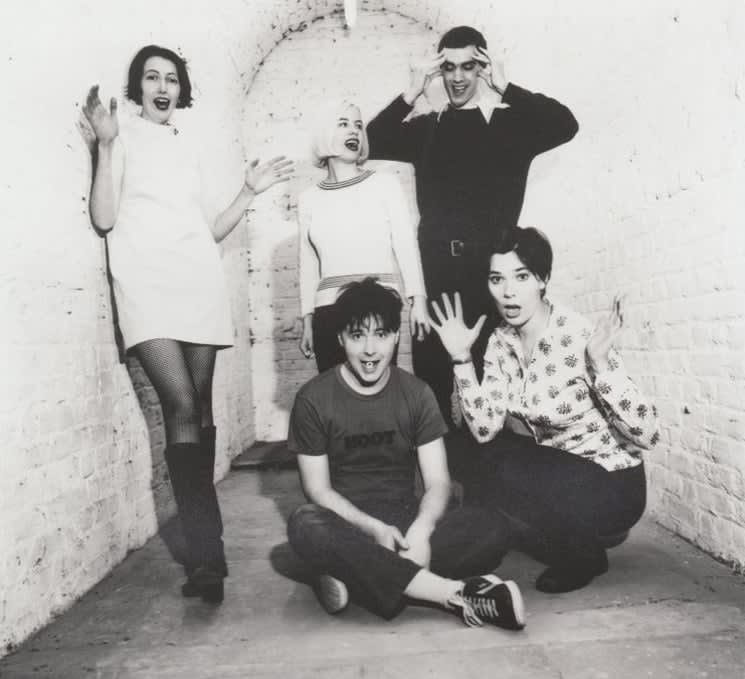Stereolab were active from 1990 to 2009 — but really, there were two different Stereolabs.
The first Stereolab existed until around the mid-'90s, and was heavily indebted to Neu!'s one-chord Krautrock grooves and the Velvet Underground's art-damaged cool. With buzzing organs, whirling guitar fuzz and interlocking hooks that favoured layering over traditional choruses, they were one of the first bands to be called "post-rock" — before that phrase became synonymous with epic instrumental jams and echo pedal experimentation.
The second Stereolab came after that, when the group's live-in-a-room sound was replaced by a dense pop tapestry of jazzy lounge rhythms, burbling electronics and lavish yé-yé exotica. Even after several albums of this psychedelic style throughout the '00s, their esoteric sound didn't become any easier to define.
In both versions of the so-called "Groop," Stereolab were structured around the core songwriting duo of Tim Gane and Lætitia Sadier. British guitarist Gane formatively dabbled in noise music and spent the latter half of the '80s in the indie pop outfit McCarthy. Bilingual French singer Sadier met Gane at one of McCarthy's shows, and she soon moved to London to be with Gane and join the band. When McCarthy broke up, Stereolab were born.
There were several changes along the way, with well over a dozen members that came and went over the years. Drummer Andy Ramsay joined in 1993 and stuck around until the band's breakup, while guitarist/multi-instrumentalist Mary Hansen was a member for a decade before her tragic death in 2002 (the same year Sadier and Gane ended their relationship).
Throughout it all, Stereolab remained prolific, churning out a remarkably consistent string of albums and amassing piles of singles and EPs (helpfully collected in a string of compilations). With Stereolab having reunited to reissue their catalogue and hit the road in 2019, we're taking a look back on the highs and lows of their remarkable run.
Essential Albums:
5. Aluminum Tunes
(1998)

Stereolab roughly released ten proper studio albums (give or take, depending on how you categorize their mini-LPs and 2010's leftovers record Not Music, but I digress). As if that weren't enough, they also released several rarities collections that are every bit as essential as the LPs. The best of the bunch is Aluminum Tunes, which was the third and final instalment in their Switched On compilation series.
Collecting material from 1994 to 1997, Aluminum Tunes documents the band at their most wildly creative transitional period. Much of the music is still guitar-driven, but the motorik rhythms are (mostly) gone, replaced by the interstellar swirl of "Space Moment," the futuristic samba of "Iron Man" and the jaunty pop bounce of "Munich Madness."
With 25 tracks and a runtime of almost two hours, Aluminum Tunes is a lot to take in — so when you get to the whimsical nine-minute flute jam "One Note Samba / Surfboard," it's a bit exhausting. But as a glimpse into the transformation of a brilliant band in their prime, Aluminum Tunes is an absolute treat.
4. Peng!
(1992)

In an alternate timeline, Stereolab could have been a fantastic twee band, and you can hear traces of scrappy C86-style pop all over their debut album. Peng! has the raw guitar clang of all their early work, but here it's spiked with bubblegum sweetness.
"Peng! 33" is an ebullient blast of speaker-blown fuzz in which Sadier coos, "Magical things are happening in this world," while "K-stars" has a cute fragility that would later be embraced by Belle and Sebastian. "Orgiastic" is a lo-fi take on My Bloody Valentine's hypnagogic shoegaze, and closer "Surrealchemist" evokes the understated experimentation of the Velvet Underground's self-titled LP.
And then there are the Krautrock jams, brought to life by Sadier's burgeoning talent for layering leftist political lyrics with haunting harmonies and wordless scatting. The band have denied being Marxist, but let's just saying there's a Marx-ish slant to a lot of these lyrics.
This is a sound that Stereolab would give a darker, stormier twist on 1993's similarly brilliant Transient Random-Noise Bursts with Announcements. But for fans of Stereolab's early work, Peng! gets the edge thanks to its brilliant dalliances with dream pop.
3. Dots and Loops
(1997)
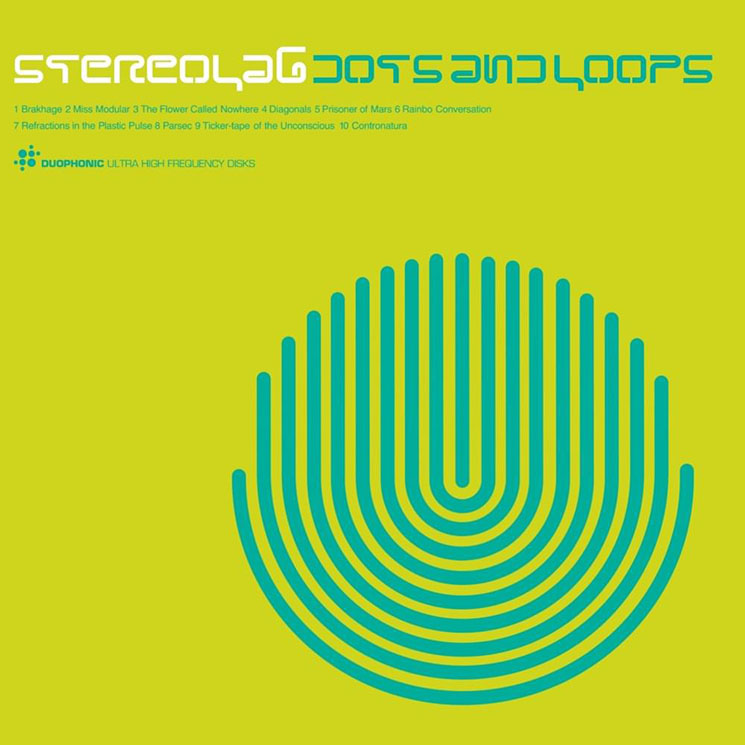
Stereolab never sold all that many records, but Dots and Loops marked the first time they landed on the Billboard charts, coming in at number 111. That's not exactly a smash hit, but it's an impressive achievement for a group making such uncompromising, adventurous music.
Dots and Loops blends some of Stereolab's most instantly gratifying pop melodies with exploratory hi-fi arrangements. Immaculately co-produced by John McEntire (of Tortoise and the Sea and Cake), it's a cosmic journey though lounge-pop smoothness and electro-tropical psychedelia. If there's any Krautrock to be found here, it's not the motorik pulse of Neu! but the freaky, funky jazz exploration of Can.
Dots and Loops is a concise ten songs — and even though that includes the shape-shifting 17-minute epic "Refractions in the Plastic Pulse," it still goes down easy. From the plinking marimbas of "Brakhage" to the heavenly muzak ascent of "Rainbo Conversation," Stereolab delivered some of their most accessible pop without sacrificing any of their experimental impulses.
2. Mars Audiac Quintet
(1994)
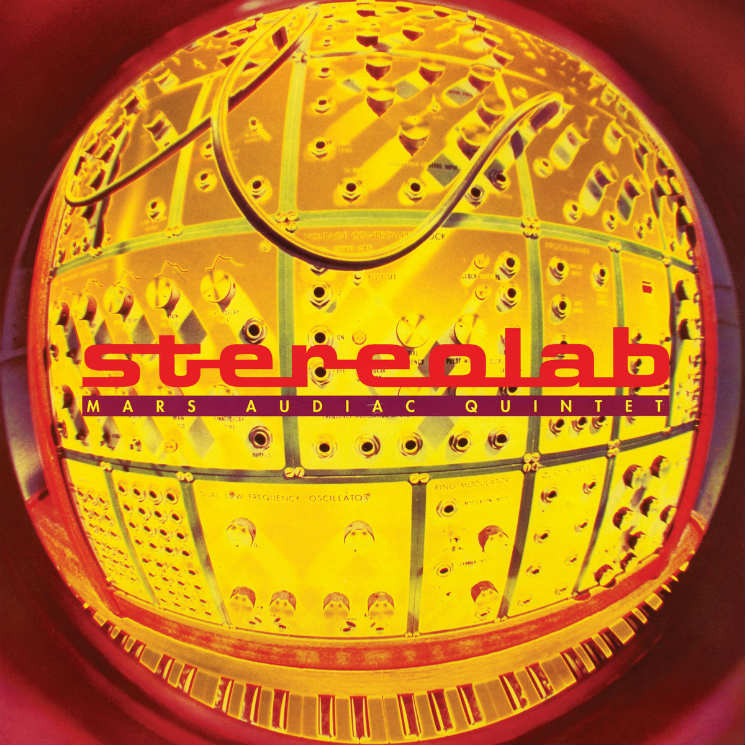
Mars Audiac Quintet does a lot with a little. It's a relatively straightforward record: it's clean and unadorned, with dry production that reveals the minimalist surge of their Krautrock rhythms, the hypnotic repetitions of Gane's chord progressions and the plainspoken directness of Sadier's anti-Capitalist mantras. Just listen to the subtle way opener "Three-Dee Melodie" lifts during the chorus with a thrumming bass line as Sadier stretches for a gorgeous high note for her thesis statement, "The meaning of existence can't be supplied by religion or ideology."
The sprawling 15-song LP is full of such simple moments of transcendence: the pulsing bass octaves of "Wow and Flutter," the gradually speeding tempos of the seven-minute "Nihilist Assault Group," the pillowy keyboard pads that envelop the mid-section of "Transporté sans bouger."
Taken within the context of Stereolab's career trajectory, there are signposts of the directions they were heading in. The sun-dazzled pop of "Ping Pong" is flecked with surf guitar and ascendant Motown horns, while closer "Fiery Yellow" is a sleepy marimba instrumental — the kind of soundscape that the Groop would soon learn to meld with more traditional pop songwriting. But this context isn't necessary to enjoy Mars Audiac Quintet, which stands as Stereolab's most satisfying rock-oriented record.
1. Emperor Tomato Ketchup
(1996)

If there were a Venn diagram of everything that makes Stereolab great — hypnotic grooves, political philosophizing in French and English, lush studio experimentation — Emperor Tomato Ketchup would be at the centre of it. It's the perfect distillation of their 20-year run: the masterpiece that lands on best-of-the-decade lists, and the must-hear entry point for newcomers dabbling in Stereolab's discography.
Named after the Japanese experimental film Tomato Kecchappu Kôtei, it's an eclectic sonic tapestry full of strange contractions and sonic sleights of hand. It's difficult to tell where the organ ends and guitar begins on the garage-spiked "The Noise of Carpet," while trip-hop opener "Metronomic Underground" feature three simultaneous vocal melodies yet still manages to sound minimalist. "Olv 26" sounds like chiptune riff-rock until it somehow morphs into a twinkling ballad, and "Tomorrow Is Already Here" begins with herky-jerky guitar chords that are brilliantly glued together by a droning organ. Even after countless listens, it's still thrilling to see how all the disparate parts come together into a seamless whole.
Stereolab were pop omnivores — across these 13 tracks, they dabble in jazz, hip-hop, classic '60s pop, experimental '70s kosmische and much more — but even when borrowing from the past, Emperor Tomato Ketchup still sounds like the future.
Further Listening:
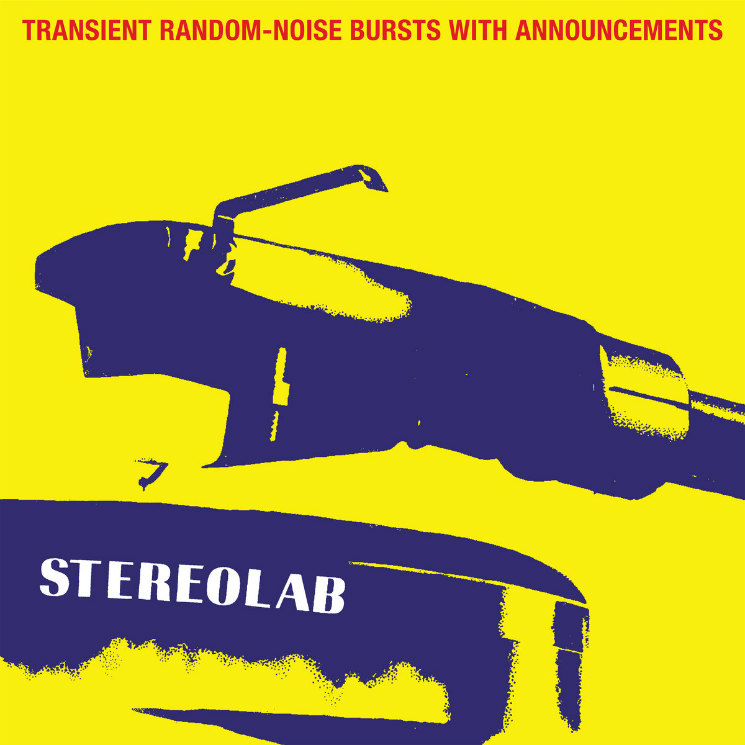
Where you go from here really depends on whether you prefer lo-fi Krautrock or psychedelic Euro-pop.
If you're into the band's early work, which leans to the former, go with 1993's Transient Random-Noise Bursts with Announcements (pictured above). It's raw and loud, and the stormy 18-minute "Jenny Ondioline" is one of the band's must-hear tunes. The 1995 compilation Refried Ectoplasm isn't quite as consistent in its brilliance, but "French Disko" and "John Cage Bubblegum" are also early-career peaks.
On the other hand, if you like the band's later work, check out 2008's Chemical Chords. With bouncy major chords and joyous soul-pop orchestrations, it's aggressively cheerful and entirely enjoyable. The 2006 compilation Fab Four Suture is another ray of sonic sunshine — and "Visionary Road Maps" is an intriguing blend of Stereolab's early-style songwriting and late-style production.
Also don't sleep on the live compilation ABC Music: The Radio 1 Sessions. Accounting for a decade's worth of BBC appearances, it offers nice, clean-sounding renditions of early-career highlights ("Peng! 33," "French Disko") and stripped-down renditions of later epics ("Metronomic Underground," "Cybele's Reverie").
If you've managed to exhaust Stereolab's discography — in which case, nice work! — check out Gane and Sadier's early project McCarthy, which is a classic English jangle-pop band of the C86 variety. More recently, Gane has gone in a squelchy electronic direction with the instrumental project Cavern of Anti-Matter, while Sadier has released mellow albums under her own name that are full of lovely, lush singer-songwriter arrangements.
What to Avoid:
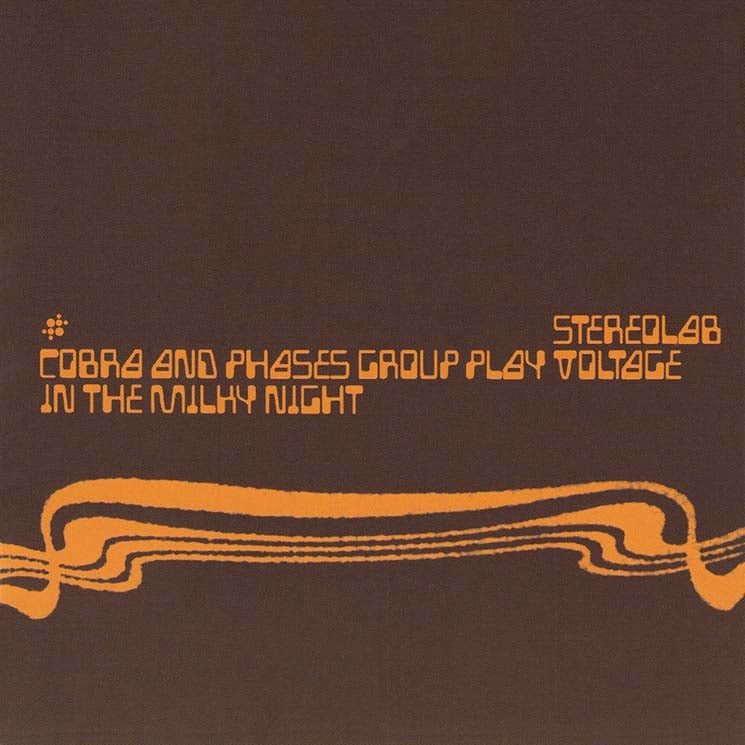
You can't go too wrong with Stereolab, since they never lost sight of the fundamental elements that made them great. That being said, Cobra and Phases Group Play Voltage in the Milky Night (pictured above) received very mixed reviews when it first came out in 1999, as it was the first time that Stereolab settled into a comfort zone rather than taking a step forward. With 15 tracks and a too-long 75-minute runtime, it's meticulously composed but lacks the magic of new discovery.
Margerine Eclipse (2004) is a frustrating listen: it's full of moments of genius — the cascading arpeggios of "Need to Be," the mix of crunchy garage chords and bubblegum keyboard melodies on "Margarine Rock" — but it's hampered by a persistent impulse to double-track drums and overstuff every moment with synth squiggles.
The first Stereolab existed until around the mid-'90s, and was heavily indebted to Neu!'s one-chord Krautrock grooves and the Velvet Underground's art-damaged cool. With buzzing organs, whirling guitar fuzz and interlocking hooks that favoured layering over traditional choruses, they were one of the first bands to be called "post-rock" — before that phrase became synonymous with epic instrumental jams and echo pedal experimentation.
The second Stereolab came after that, when the group's live-in-a-room sound was replaced by a dense pop tapestry of jazzy lounge rhythms, burbling electronics and lavish yé-yé exotica. Even after several albums of this psychedelic style throughout the '00s, their esoteric sound didn't become any easier to define.
In both versions of the so-called "Groop," Stereolab were structured around the core songwriting duo of Tim Gane and Lætitia Sadier. British guitarist Gane formatively dabbled in noise music and spent the latter half of the '80s in the indie pop outfit McCarthy. Bilingual French singer Sadier met Gane at one of McCarthy's shows, and she soon moved to London to be with Gane and join the band. When McCarthy broke up, Stereolab were born.
There were several changes along the way, with well over a dozen members that came and went over the years. Drummer Andy Ramsay joined in 1993 and stuck around until the band's breakup, while guitarist/multi-instrumentalist Mary Hansen was a member for a decade before her tragic death in 2002 (the same year Sadier and Gane ended their relationship).
Throughout it all, Stereolab remained prolific, churning out a remarkably consistent string of albums and amassing piles of singles and EPs (helpfully collected in a string of compilations). With Stereolab having reunited to reissue their catalogue and hit the road in 2019, we're taking a look back on the highs and lows of their remarkable run.
Essential Albums:
5. Aluminum Tunes
(1998)

Stereolab roughly released ten proper studio albums (give or take, depending on how you categorize their mini-LPs and 2010's leftovers record Not Music, but I digress). As if that weren't enough, they also released several rarities collections that are every bit as essential as the LPs. The best of the bunch is Aluminum Tunes, which was the third and final instalment in their Switched On compilation series.
Collecting material from 1994 to 1997, Aluminum Tunes documents the band at their most wildly creative transitional period. Much of the music is still guitar-driven, but the motorik rhythms are (mostly) gone, replaced by the interstellar swirl of "Space Moment," the futuristic samba of "Iron Man" and the jaunty pop bounce of "Munich Madness."
With 25 tracks and a runtime of almost two hours, Aluminum Tunes is a lot to take in — so when you get to the whimsical nine-minute flute jam "One Note Samba / Surfboard," it's a bit exhausting. But as a glimpse into the transformation of a brilliant band in their prime, Aluminum Tunes is an absolute treat.
4. Peng!
(1992)

In an alternate timeline, Stereolab could have been a fantastic twee band, and you can hear traces of scrappy C86-style pop all over their debut album. Peng! has the raw guitar clang of all their early work, but here it's spiked with bubblegum sweetness.
"Peng! 33" is an ebullient blast of speaker-blown fuzz in which Sadier coos, "Magical things are happening in this world," while "K-stars" has a cute fragility that would later be embraced by Belle and Sebastian. "Orgiastic" is a lo-fi take on My Bloody Valentine's hypnagogic shoegaze, and closer "Surrealchemist" evokes the understated experimentation of the Velvet Underground's self-titled LP.
And then there are the Krautrock jams, brought to life by Sadier's burgeoning talent for layering leftist political lyrics with haunting harmonies and wordless scatting. The band have denied being Marxist, but let's just saying there's a Marx-ish slant to a lot of these lyrics.
This is a sound that Stereolab would give a darker, stormier twist on 1993's similarly brilliant Transient Random-Noise Bursts with Announcements. But for fans of Stereolab's early work, Peng! gets the edge thanks to its brilliant dalliances with dream pop.
3. Dots and Loops
(1997)

Stereolab never sold all that many records, but Dots and Loops marked the first time they landed on the Billboard charts, coming in at number 111. That's not exactly a smash hit, but it's an impressive achievement for a group making such uncompromising, adventurous music.
Dots and Loops blends some of Stereolab's most instantly gratifying pop melodies with exploratory hi-fi arrangements. Immaculately co-produced by John McEntire (of Tortoise and the Sea and Cake), it's a cosmic journey though lounge-pop smoothness and electro-tropical psychedelia. If there's any Krautrock to be found here, it's not the motorik pulse of Neu! but the freaky, funky jazz exploration of Can.
Dots and Loops is a concise ten songs — and even though that includes the shape-shifting 17-minute epic "Refractions in the Plastic Pulse," it still goes down easy. From the plinking marimbas of "Brakhage" to the heavenly muzak ascent of "Rainbo Conversation," Stereolab delivered some of their most accessible pop without sacrificing any of their experimental impulses.
2. Mars Audiac Quintet
(1994)

Mars Audiac Quintet does a lot with a little. It's a relatively straightforward record: it's clean and unadorned, with dry production that reveals the minimalist surge of their Krautrock rhythms, the hypnotic repetitions of Gane's chord progressions and the plainspoken directness of Sadier's anti-Capitalist mantras. Just listen to the subtle way opener "Three-Dee Melodie" lifts during the chorus with a thrumming bass line as Sadier stretches for a gorgeous high note for her thesis statement, "The meaning of existence can't be supplied by religion or ideology."
The sprawling 15-song LP is full of such simple moments of transcendence: the pulsing bass octaves of "Wow and Flutter," the gradually speeding tempos of the seven-minute "Nihilist Assault Group," the pillowy keyboard pads that envelop the mid-section of "Transporté sans bouger."
Taken within the context of Stereolab's career trajectory, there are signposts of the directions they were heading in. The sun-dazzled pop of "Ping Pong" is flecked with surf guitar and ascendant Motown horns, while closer "Fiery Yellow" is a sleepy marimba instrumental — the kind of soundscape that the Groop would soon learn to meld with more traditional pop songwriting. But this context isn't necessary to enjoy Mars Audiac Quintet, which stands as Stereolab's most satisfying rock-oriented record.
1. Emperor Tomato Ketchup
(1996)

If there were a Venn diagram of everything that makes Stereolab great — hypnotic grooves, political philosophizing in French and English, lush studio experimentation — Emperor Tomato Ketchup would be at the centre of it. It's the perfect distillation of their 20-year run: the masterpiece that lands on best-of-the-decade lists, and the must-hear entry point for newcomers dabbling in Stereolab's discography.
Named after the Japanese experimental film Tomato Kecchappu Kôtei, it's an eclectic sonic tapestry full of strange contractions and sonic sleights of hand. It's difficult to tell where the organ ends and guitar begins on the garage-spiked "The Noise of Carpet," while trip-hop opener "Metronomic Underground" feature three simultaneous vocal melodies yet still manages to sound minimalist. "Olv 26" sounds like chiptune riff-rock until it somehow morphs into a twinkling ballad, and "Tomorrow Is Already Here" begins with herky-jerky guitar chords that are brilliantly glued together by a droning organ. Even after countless listens, it's still thrilling to see how all the disparate parts come together into a seamless whole.
Stereolab were pop omnivores — across these 13 tracks, they dabble in jazz, hip-hop, classic '60s pop, experimental '70s kosmische and much more — but even when borrowing from the past, Emperor Tomato Ketchup still sounds like the future.
Further Listening:

Where you go from here really depends on whether you prefer lo-fi Krautrock or psychedelic Euro-pop.
If you're into the band's early work, which leans to the former, go with 1993's Transient Random-Noise Bursts with Announcements (pictured above). It's raw and loud, and the stormy 18-minute "Jenny Ondioline" is one of the band's must-hear tunes. The 1995 compilation Refried Ectoplasm isn't quite as consistent in its brilliance, but "French Disko" and "John Cage Bubblegum" are also early-career peaks.
On the other hand, if you like the band's later work, check out 2008's Chemical Chords. With bouncy major chords and joyous soul-pop orchestrations, it's aggressively cheerful and entirely enjoyable. The 2006 compilation Fab Four Suture is another ray of sonic sunshine — and "Visionary Road Maps" is an intriguing blend of Stereolab's early-style songwriting and late-style production.
Also don't sleep on the live compilation ABC Music: The Radio 1 Sessions. Accounting for a decade's worth of BBC appearances, it offers nice, clean-sounding renditions of early-career highlights ("Peng! 33," "French Disko") and stripped-down renditions of later epics ("Metronomic Underground," "Cybele's Reverie").
If you've managed to exhaust Stereolab's discography — in which case, nice work! — check out Gane and Sadier's early project McCarthy, which is a classic English jangle-pop band of the C86 variety. More recently, Gane has gone in a squelchy electronic direction with the instrumental project Cavern of Anti-Matter, while Sadier has released mellow albums under her own name that are full of lovely, lush singer-songwriter arrangements.
What to Avoid:

You can't go too wrong with Stereolab, since they never lost sight of the fundamental elements that made them great. That being said, Cobra and Phases Group Play Voltage in the Milky Night (pictured above) received very mixed reviews when it first came out in 1999, as it was the first time that Stereolab settled into a comfort zone rather than taking a step forward. With 15 tracks and a too-long 75-minute runtime, it's meticulously composed but lacks the magic of new discovery.
Margerine Eclipse (2004) is a frustrating listen: it's full of moments of genius — the cascading arpeggios of "Need to Be," the mix of crunchy garage chords and bubblegum keyboard melodies on "Margarine Rock" — but it's hampered by a persistent impulse to double-track drums and overstuff every moment with synth squiggles.
